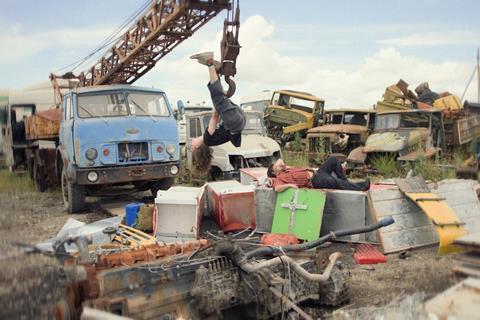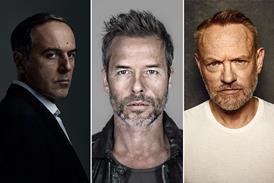Colourful, uneven Georgian debut explores the city of Tbilisi through the exploits of two door-to-door salesmen

Dir: Tato Kotetishvili. Georgia/Netherlands. 2024. 95mins
A tale of friendship and trying to make a buck against a backdrop of modern Tbilisi, Holy Electricity begins in charmingly off-kilter territory but gradually sacrifices its narrative to eccentricity as a goal in and of itself. Georgia-born Tato Kotetishvili’s experience as a cinematographer on films including Uta Beria’s Negative Numbers shows in his ability to capture eye-catching moments. In story terms he’s less successful, as he and his co-writers Irine Jordania and Nutsa Tsikaridze seem intent on pulling in several directions at once.
Sacrifices its narrative to eccentricity
Festivals are already showing faith in Holy Electricity, however, which premiered at Locarno (taking the Cineasti del Presente prize) before travelling on to Sarajevo, and further play on the circuit is likely. Those who enjoyed the offbeat Georgian fairytale What Do We See When We Look at the Sky? (2021) are likely to be initially drawn in but, where Aleksandre Koberidze’s shaggy romance gradually built up a head of steam, Kotetishvili’s wry comedy becomes rather less than the sum of its quirks.
At the heart of this story is Gonga (debut star Nika Gongadze), a gangly teen whose party trick is playing the recorder with his nose. His father has just died, leading his older transgender relative Bart (trans activist Nikolo Ghviniashvili, also in his first acting role) to pledge to look after him. The pair spend time scavenging down at the local dump or visiting homes in a bid to buy up everything from instruments and crockery to outsized teddy bears. They strike on what they hope will be a get-rich-quick scheme when they find a couple of suitcases containing elderly crucifixes and pimp them up with neon lights.
This puts them on track for yet more door-to-door encounters with the Tbilisi citizenry as they try to hawk their wares, spurred by the fact that Bart has gambling debts – a storyline that, like several plot strands, briefly threatens to become interesting before fading away.
Kotetishvili is in love with clutter. The scrapyard is a junk junkie’s dream and there is a lived-in look to many of the homes here that stems from the fact that the writer/director cast real Georgian residents, often in their own apartments. The filmmaker’s fixed camerawork (he also acts as cinematographer) allows us to drink in scenes including an elderly man with an astonishing range of drum kits, a woman with a menagerie of pets and an ageing contortionist with a neat trick or two.
The locked-off shots also permit Kotetishvili to reveal a detail after characters have been talking about it for some time. This allows for enjoyable pay-offs when we find out what a handful of roguish kids are doing with the matches they’re playing with, and the cornucopia of contents of a fish tank artwork a woman has dubbed “the birth of the world”. Nodar Nozardze’s editing is humorously employed to cross-cut between apartments at more than one point, with a rhythm that Holy Electricity could use more of.
Episodic by nature, things start to fully fragment after both Gonga and Bart – enjoyably hapless together – attempt to embark on separate romances. Gonga woos a young Romani coffee seller (Angela Delisenko), while Bart takes a shine to the “birth of the world” artist (Ineza Tsomaia). Away from the more visually arresting apartment scenes, the rambling dialogue becomes more exposed and the film’s structural flaws start to take their toll. Kotetishvili is drawn to colour, whether it’s a person spontaneously breaking into song or the neon brightness of the crucifixes, but he becomes so intent on highlighting the fringes of his film that he and his co-writers neglect the central structure needed to successfully hold it all together.
Production companies: Zango Studio, Nushi Film
International sales: zangostudio@gmail.com, info@nushifilm.com
Producers: Tato Kotetishvili, Tekla Machavariani
Screenplay: Tato Kotetishvili, Irine Jordania, Nutsa Tsikaridze
Cinematography: Tato Kotetishvili
Production design: Anuka Kalandarishvili, Nato Bagrationi
Editing: Nodar Nozadze
Music: Vaqo (Vakhtang Kantaria), Nika Paniashvili, Nodar Nozadze
Main cast: Nikolo Ghviniashvili, Nika Gongadze, Angelina Delisenko, Ineza Tsomaia, Salome Baturishvili
























